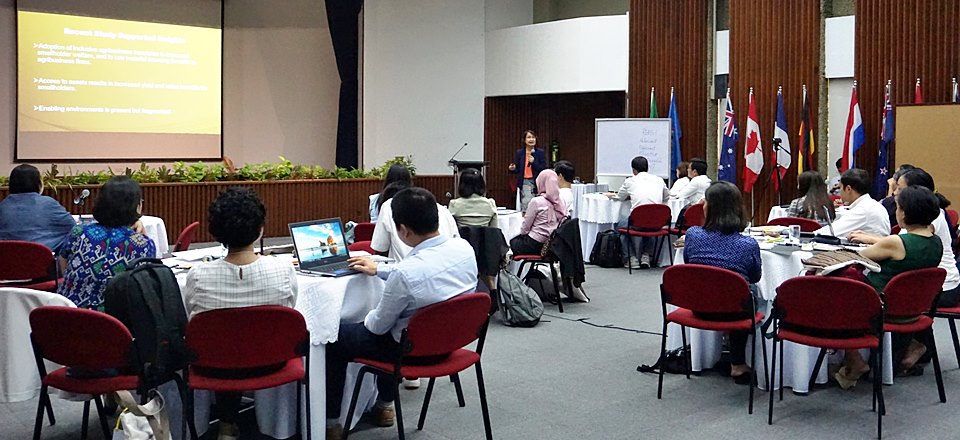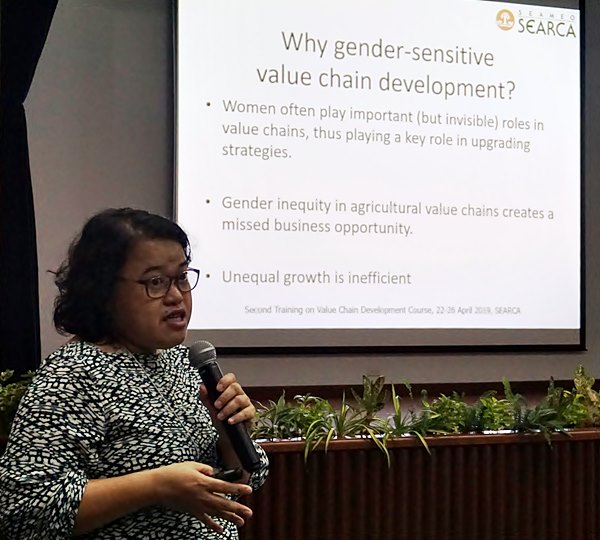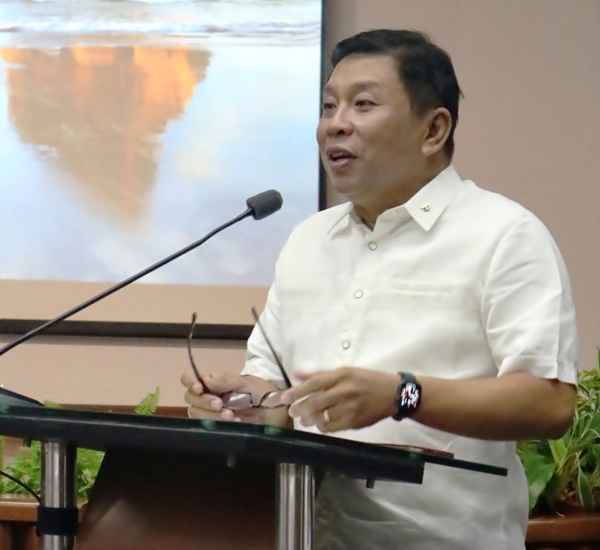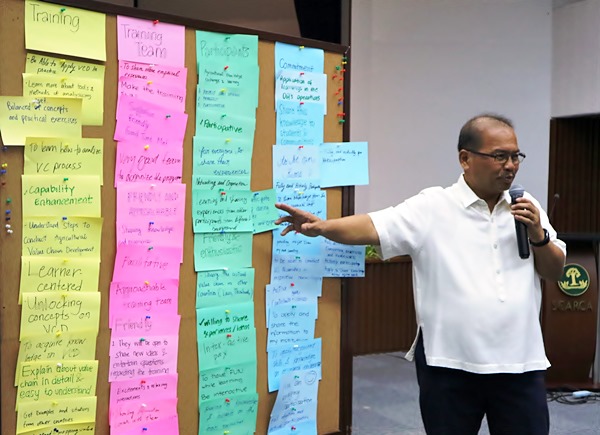
LOS BAÑOS, LAGUNA, Philippines – In its continuous commitment to promote inclusivity and sustainability in the agricultural value chain development, the Southeast Asian Regional Center for Graduate Study and Research in Agriculture (SEARCA) conducted the 2nd Value Chain Development (VCD) Course on 22-26 April 2019 at the SEARCA Headquarters, here.
On its second year, the SEARCA-pioneered VCD course aimed to look through the agricultural value chain lens in order to analyze and design interventions to promote value addition for various value chain players, especially the marginalized actors in the process.
Accordingly, the course also sought to capacitate the participants in identifying gaps and designing interventions on how inclusivity could be integrated in the midst of the current socioeconomic dynamism, production technologies, and government and market structures in both national and regional context across Southeast Asia.
 For this year, the 2nd VCD course introduced a more well-balanced facet of inclusivity by including the gender lens through a lecture-discussion on gender mainstreaming in agricultural value chains and integration of the gender element in the workshop discussions and outputs throughout the course.
For this year, the 2nd VCD course introduced a more well-balanced facet of inclusivity by including the gender lens through a lecture-discussion on gender mainstreaming in agricultural value chains and integration of the gender element in the workshop discussions and outputs throughout the course.
The training-workshop kicked-off as University of the Philippines Los Baños (UPLB) Chancellor and SEARCA Governing Board Chair Dr. Fernando C. Sanchez, Jr., formally welcomed the cadre of 20 research and development professionals and practitioners, representing the academe, government institutions, and local government units across the Philippines and Southeast Asian countries.
In his opening remarks, Chancellor Sanchez stressed the significance of promoting social inclusion in value chain development and agribusiness commodity systems to be able to strike a balance between market productivity and inclusivity and greater participation of marginalized and smallholder farmers in the agricultural value chain.
 Dr. Sanchez, further, shared that the vitality of capitalizing on social inclusion has been the core of SEARCA's Inclusive and Sustainable Rural and Agricultural Development (ISARD), in support of Sustainable Development Goal (SDG) No. 8, "Promoting inclusive and sustainable economic growth, employment, and decent work for all." He noted that this theme of SEARCA's Tenth Five-Year Plan calls for steering wide-ranging opportunities for all players in the agricultural value chain attuned to regional dynamics of the ASEAN Economic Integration.
Dr. Sanchez, further, shared that the vitality of capitalizing on social inclusion has been the core of SEARCA's Inclusive and Sustainable Rural and Agricultural Development (ISARD), in support of Sustainable Development Goal (SDG) No. 8, "Promoting inclusive and sustainable economic growth, employment, and decent work for all." He noted that this theme of SEARCA's Tenth Five-Year Plan calls for steering wide-ranging opportunities for all players in the agricultural value chain attuned to regional dynamics of the ASEAN Economic Integration.
"The challenge therefore is for various institutions and stakeholders, especially smallholder farmers and small-scale rural entrepreneurs, to step up to the plate and maximize the benefits of borderless trade," Chancellor Sanchez, highlighted.
The Chancellor ended his remarks with high hopes that the experiential and practical learnings from the course will serve as benchmarks for the participants to be able to analyze and develop value chains in their respective institutions, and thus, facilitate the integration of smallholder farmers and rural entrepreneurs into a vibrant agricultural and rural economy.
UPLB College of Public Affairs and Development (CPAf) Professor Wilfredo Carada, joined by Dr. Aileen V. Lapitan and Professor Rhea Ledesma-Gumasing of CPAf's Institute for Governance and Rural Development (IGRD), served as resource persons and training facilitators for the entirety of the five-day training-workshop.
United Nations Development Program Economist and Policy Advisor Mr. John Garrity will also grace the VCD Course and share his expertise on reworking the value chain in the face of digitalization.
 On the first day of the course, Professor Wilfredo Carada introduced the overview and objectives of the VCD course, as he stressed the imperative of developing an inclusive value chain development to steer increased vibrancy and productivity for the overall improvement of the agriculture and rural sector in ASEAN countries.
On the first day of the course, Professor Wilfredo Carada introduced the overview and objectives of the VCD course, as he stressed the imperative of developing an inclusive value chain development to steer increased vibrancy and productivity for the overall improvement of the agriculture and rural sector in ASEAN countries.
Significantly, Professor Carada noted that inclusivity means bringing positive and desirable change in the activities in the agricultural value chain, wherein advanced competency and productivity would also create an enabling environment for marginalized smallholder farmers and fisherfolks, and increase their integration and opportunities to secure a fair share in the value chain process.
On the same note, NEXUS Agribusiness Solutions Managing Director Dr. Nerlita M. Manalili discussed the inclusivity and sustainability challenges in the Southeast Asia agriculture and rural sector. She emphasized the need to focus on inclusive agriculture and agribusiness development, and how the elements of inclusiveness and sustainability should work together in the value chain process. Dr. Manalili pointed out that greater capacities for the farmers should always be accompanied with increased market access and opportunities for sustainable growth and food security down to the household level.
Dr. Manalili also enthused the participants to fully understand the value chain context, wherein she highlighted the need to add "value" on product transformation across the stages and processes of the value chain. She noted, however, that challenges brought about by the changing mix and dynamism of existing market players, commodities should be addressed by ASEAN countries towards efficiency-driven market integration in the current globalization of agricultural production.
The course participants were divided into five groups, each with an assigned commodity, namely: cinnamon, rice, mango, high-value crops, and white potato. Each group will develop and present a value chain analysis and intervention design for their selected agricultural commodity. Specifically, each design includes a sector situationer; value chain analysis and mapping; value chain development strategy; organizational/ institutional arrangements for VCD; and a monitoring and evaluation plan. Individually, participants will present and submit their respective re-entry action plans (REAP), outlining how they will use, in their workplace or industry, the learning gains in the course.
The training course combines lecture-discussions and interactive training techniques, with workshop outputs to be presented in plenary as a venue for knowledge-sharing and synthesizing. The eleven lecture-discussion throughout the 5-day course converge the fundamental frameworks, principles, components and processes of the value chain system, and their practical skills and application. (Karen Serrano and Rosario B. Bantayan)
